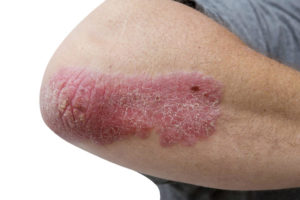Psoriasis
What is Psoriasis?

Nearly seven million people in the United States have psoriasis. Psoriasis may also affect the fingernails, toenails, soft tissue and the inside of the mouth. Psoriasis occurs in all age groups but it primarily affects adults and it appears equally in males and females.
The most common form of psoriasis which affects 80-90 percent of psoriasis patients, is plaque psoriasis. Plaque psoriasis is characterized by patches of red, raised skin that is covered with silvery-white scales. This usually is seen on the scalp, knees, elbows, hands and feet. Around 30 perfect of people with psoriasis experience joint inflammation that produces symptoms of arthritis. This is called psoriatic arthritis.
Psoriasis Types
Psoriasis patients usually have one or more of these types of psoriasis:
- Plaque
- Guttate
- Inverse
- Pustular
- Eryathemia
Any part of the external skin may be affected by psoriasis including the scalp and down to the toes, even though this is rare. There have been reports of psoriasis infecting the internal portions of the body.
- Plaque
- Guttate
- Inverse
- Pustular
- Eryathemia
Psoriasis Causes
The cause of psoriasis isn’t completely known, but it’s related to an immune system problem with cells in your body. One white blood cell type called a T lymphocyte or T cell, travels through your body to detect and fight off foreign substances, such as bacteria or viruses. For individuals who have psoriasis, the T cells attack healthy skin cells by mistake, as if they are trying to heal a wound or fight off an infection. Scientists have learned that a person’s immune system and genes play important roles in psoriasis. Scientists also know that not everyone who carries the genes for psoriasis will get psoriasis.
Psoriasis is not contagious. You cannot get psoriasis by touching someone who has psoriasis or by swimming in the same pool as someone with psoriasis.
Many patients say their psoriasis began after they experienced one of the following triggers:
- A stressful event
- Strep throat
- Taking certain medications
- Cold weather
- Dry Weather
- Injuries and infections to the skin
- Smoking
- Heavy alcohol consumption
Clothing may cause the psoriatic plaques to become thickened and scaly. If the garments are tight or rub on the plaques, they may cause fissuring, increasing the possibilities of infections or other irritations.
Psoriasis Treatments
Psoriasis may be treated in multiple different ways. A topical therapy on the outside of the skin using emollients including topical corticosteroids or calcitrene inhibitors may be used, or the patient may receive systemic therapy including methotrexate or azathioprine. Some patients may respond to narrow band UVB if they have access to it at their dermatology clinic. Another option for patients with extensive psoriasis is biologics which include medications such as Humira, Stelara or Enbrel, however these medications do require some testing prior to initiation of therapy.
Due to the genetic nature of psoriasis, it will not go away, but it can be controlled by topical agents or systemic agents.
To learn more about psoriasis, or to schedule your consultation with Board-Certified Dermatologist Dr. Weyer, please fill out the form on this page. You can call our Tucson location at 520-207-3100 or our Sierra Vista location at 520-458-1787. We look forward to seeing you soon!

